Tackling RYA Powerboat Level 2 Powerboat Handling
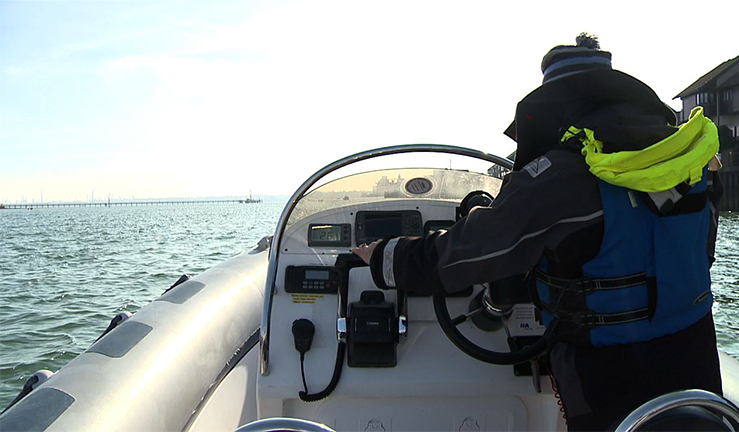
RYA Senior Communications Officer and Editor of InBrief, Emma Slater, shares her experience of the RYA Powerboat Level 2 course...
I don’t profess to be an amazing sailor but I have completed a few courses and have some sea miles under my belt. However, when it comes to power boating I’m a complete novice. Working for the RYA's communications team, I’m often out in RIBs working with the RYA’s video producer, interviewing boaters and taking photos - and have watched and admired the skill of our RIB drivers as they whizz around race courses keeping ahead of the action, manoeuvre effortlessly in to what sometimes appear to be the tiniest of gaps and gently apply the throttle for a smooth ride.
After numerous outings holding on at the back I decided it was time I got my hands on the throttle, so, along with my colleagues James and Chris, I signed up to tackle the RYA Powerboat Level 2 course and get some skills of my own.
Hear how James, Chris and I got on when we visited one of our local training centres, Southampton Water Activity Centre (SWAC) in Southampton, where our instructor Jon Kirby put us through our paces and honed our skills to claim our PB Level 2 certificates.
Why did you want to take the course?
Chris: It’s a course that I have wanted to do for a while as a sailor with access to RIBs, as it gives you an understanding of using powerboats but more importantly, for me, access to an ICC.
Emma: I wanted to take the course so that when I’m out on the water doing interviews if I needed to take control of the boat I would know what to do. Also I think it’s a really useful skill to have.
James: As the RYA’s video producer I’m often out in RIBs so I needed to know how to drive one in case of an emergency.
What expectations did you have for the course? What did you think it would involve? Anything you were concerned about before doing it?
Emma: I was hoping that we would have lots of time actually doing the skills. I knew there would be classroom elements to the course but I am a practical person and learn best by doing. My biggest concern was the possibility of me doing something wrong and crashing the boat!
Chris: Truthfully I wasn’t expecting so much hands-on experience. I was expecting a fair amount of it to be classroom based, so was surprised at the amount of time we had in the boats. I knew the course was about boat handling skills and safety, as I have friends that have done the course. The only concern was how cold the weather was going to be!
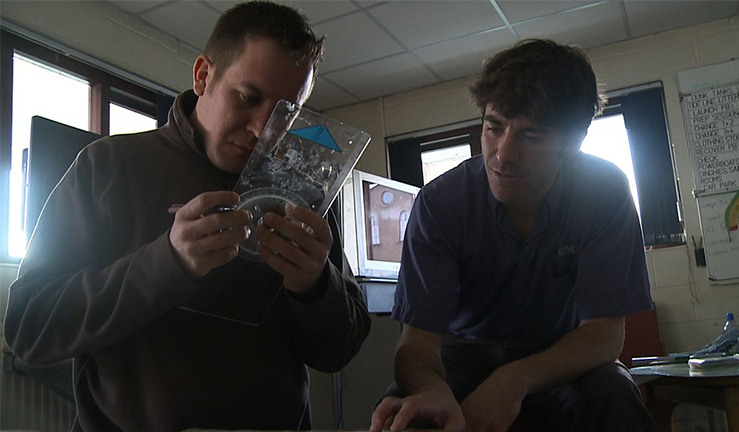
Chris (left) in the classroom
Can you talk us through what you did on the course?
Chris: The course I did at SWAC was a 2 day course. Firstly we were introduced to the RIB. We were shown around all areas of the RIB explaining what things were and what they did, but most importantly the kill cord and grab bag. After this is we talked through and then launched the RIB from a trailer. It was then out on the water where we did some basic manoeuvres so we knew how the boat would handle, figure of 8’s forwards and backwards etc. Then it was in to the classroom to talk about weather and first aid. From here it was back out on the boat to do some tight space handling, followed by some slow speed approaches to a mooring buoy. We also discussed ColRegs in the class room and when we were on the water.
On the second day we were using a bigger RIB with twin engines. To start the day, as a group we did some navigation work, planning where we were going and the length of time it would take. We were then off to the RIB, where we started with some slow speed handling in confined spaces to get used to how this bigger RIB handled. It was then time to fuel up which involved tackling a lock. From here we started our passage plan and did some high-speed turns. The emphasis here was about the whole boat communicating and being part of what we were doing. After lunch we did the return passage, when we did a lot of man-over-board practice. We finished our time on the water with some final coming alongside practice and close quarters handling. It was then back to the classroom for a bit of rope work.
Emma: As you can see from Chris’s account it was a pretty full on two days but great fun. Our instructor was excellent at answering any questions or concerns we had and giving us all plenty of time to really get to grips with what we were learning. One thing I did find surprising was when we launched the RIB for the first time how easy it was to push the trailer with the RIB on it and manoeuvre it to the water, easily managing to do it on my own!
James: I was pleased that before we did anything we had a briefing with our instructor so he could establish what level of experience we all had.
What part of the course did you enjoy the most?
James: I loved that the course was very practical and even when you’re not driving the boat you are always busy helping the driver and learning from the instructor.
Chris: I think the most enjoyable part was all of the boat handing I did. It was great to have someone there telling you what you needed to do, but also not being so involved that you weren’t feeling that it was all in your control. Probably the best part is when you complete your first small space manoeuvre.
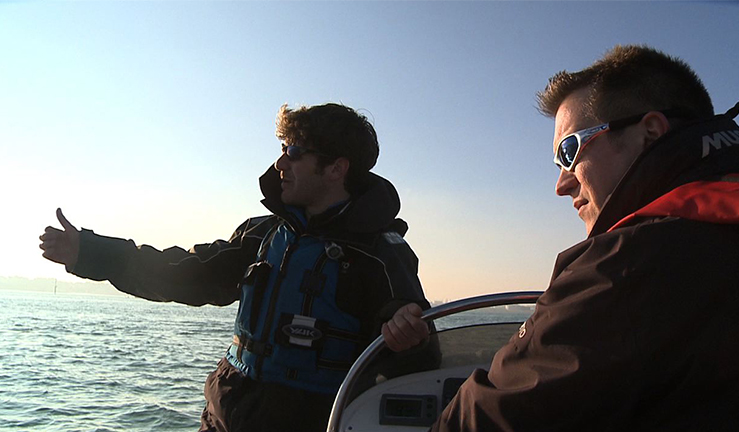
Chris at the throttle
Emma: Much like Chris I really enjoyed the hands-on part of the course, actually taking control of the throttle and making the decisions about how to manoeuvre the boat, park it, and turn it around.
What elements of the course did you find difficult?
Chris: I did have a bit of difficulty doing some of the slower manoeuvres like approaching the buoy, but the more time I spent doing these, the more and more confident I got.
James: The most difficult aspect of the course for me was the rules of road, but John explained it really clearly to me and kept reinforcing what he was telling me when we were on the water which made things much easier to understand.
Was it easier / harder to do than you may have thought?
Emma: Surprisingly I actually found it easier than I thought it was going to be, even when we moved into the larger RIB which did have me quite worried the first time I saw it. But having John close by did help build my confidence.
James: It was easier than I thought. Once you have a basic understanding of piloting the RIB it then becomes more about the rules of the road and how the tide and wind will affect your passage.
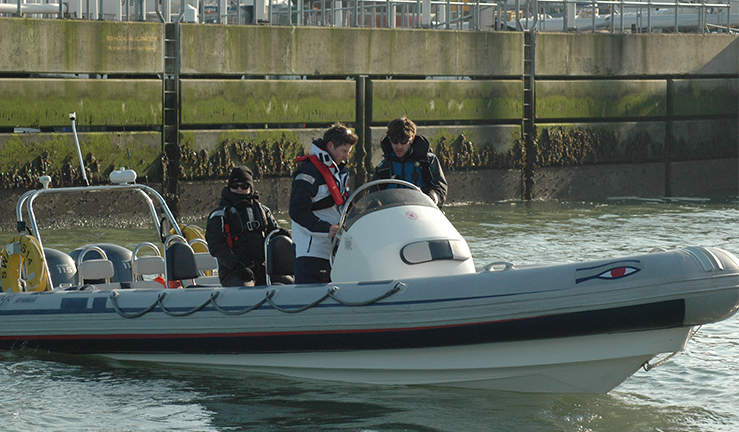
James getting some instruction before we get underway
Chris: I think it was actually harder than I was expecting, some of the slower speed handling was very difficult to start with.
What did you learn from the course?
James: Tons. It was a real eye opener.
Chris: I learnt a lot, the main thing being that you always wear a kill cord, but also some great techniques and skill of boat handling in confined spaces.
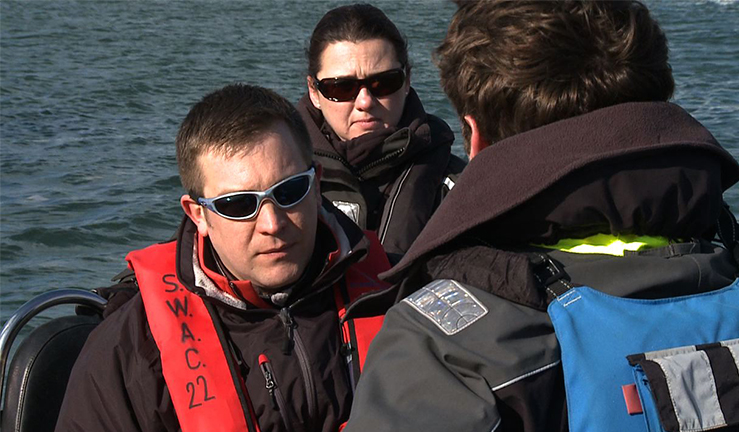
Chris and I listen closely to Jon’s instructions
Emma: I learnt loads, especially the skills needed for manoeuvring in small spaces and bringing the boat alongside and the importance of always wearing a kill cord and communicating with others on board.
Why do you think this is a good course to do?
James: I think anyone that’s thinking about putting themselves at the controls of a RIB needs to go on this course, for their own safety and the safety of their passengers.
Emma: The course gives you a really good appreciation of how important it is to know what you are doing when out on the water and build knowledge and confidence handling your boat.
Chris: It’s a great way for people to learn about using RIBs and powerboats and gain experience and knowledge that will make them safe on the water. I personally think all boat owners should have a qualification like this.
How will you be using the skills your learnt?
Emma: It means that when we have to go interview, film or photograph people on the water I can drive one of the RYA RIBs and not always have to rely on a third party to take us.
Chris: I have gained an ICC so I will hopefully using my PB2 qualification when on honeymoon this year, but mainly, it’s to support the team when they have filming/interviewing duties on the water.
James: The general understanding I have gained from attending the course has given me the basic skills to drive the RIB and what to do in an emergency situation and how to avoid those situations in the first place.
Will you be doing any more PB courses?
Chris: I'm thinking about doing the Advanced or Safety Boat courses next.
What would you say to someone else thinking about taking the course?
Emma: Just do it. You’d be surprised what you can achieve in just two days. The course is full on but loads of fun and you’ll come away with loads of new skills.
Chris: Do it, it’s a lot of fun and a great way to learn something on the water in two days that gives you an internationally accepted qualification.
Want to know more about RYA Powerboat Level 2?
The RYA Level 2 Powerboat Handling course is a two day course that provides the skills and background knowledge need to drive a powerboat and is the basis of the International Certificate of Competence (ICC).
The course includes close quarters handling, high speed manoeuvres, man overboard recovery and collision regulations and can be taken on inland or coastal waters, with your certificate being endorsed accordingly.
Course overview
| Assumed knowledge | None. May be preceded by Level 1 |
| Minimum duration | 2 days |
| Minimum age | 12. Candidates under the age of 16 will be issued with an endorsed certificate |
| Course content | Launching and recovery, boat handling, securing to a buoy, anchoring, leaving and coming alongside, man overboard |
| Ability after the course | Self-sufficient powerboater in the right conditions, aware of own limitations and those of the craft |
Top Tips
Our instructor, Jon Kirby from Southampton Watersports Activity Center (SWAC), shares his top tips for powerboat handling.
Find out more about RYA Powerboat Level 2 and other RYA courses at: rya.org.uk/training.
